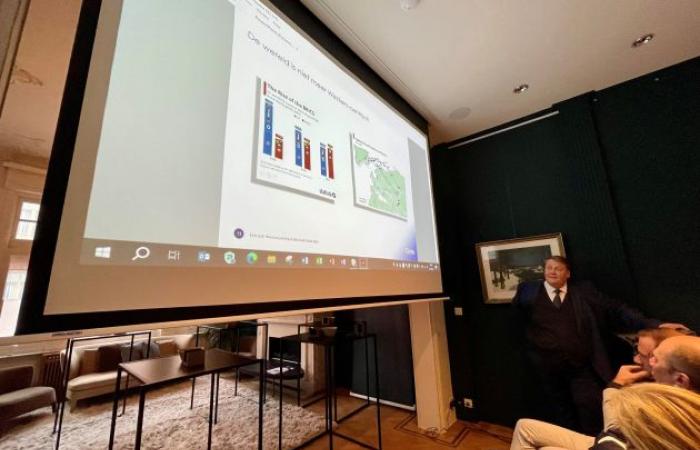
As an investment company, GIMV manages a portfolio of around 60 companies with a combined turnover of 3.7 billion euros. Growers those
often achieve double digits, and together they employ 20,000 professionals. With figures like these, it goes without saying that a lot of expertise was hidden in their CEO’s presentation. With his hopeful predictions he was certainly a lot less negative than the general current trend
media landscape.
“Despite all the doom and gloom that often prevails in the reporting, it remains an objective observation that industrial estates are immediately filled and, if possible, there are shortages themselves,” said Dejonckheere. “Despite the many restructurings left and right, employees often quickly remain one
find a new job thanks to the tightness and scarcity that still exists in the labor market.”
USP’S of Flanders and Belgium
“Flanders is an innovation champion thanks to its colleges and universities, and their state-of-the-art (industrial) companies that put maximum effort into R&D,” says Koen Dejonckheere. “We still have a very highly educated population. In addition, we have the many advantages of our central location on the European continent with one of the most important ports. It should not be underestimated that we are well surrounded by some of the wealthiest and wealthy
countries of the EU. In addition, there are many most important institutions and decision-making bodies that are located here, and as a small Belgian country we cannot easily get there.
as sometimes described.”
Look at education
Koen Dejonckheere also had a remarkably positive view of the level of education. “Of course there are differences, stumbling blocks and major challenges ahead, such as modernization and digitalization that are developing at a rapid pace,” he said. “But the reason why the level is said to be declining is mainly due to the fact that there are students with learning delays, language barriers or who cannot yet surf the digital revolution and the like. These students thus color the objective intelligence tests and thus pass the overall average downwards, which gives a distorted picture of the actual quality and level of our education. Naturally, these are major points of attention that must be dealt with carefully. Consideration must be given to the ways in which we can best deal with these themes and issues in concrete terms How can we tackle and solve problems for people with fewer resources and/or a different background?
offer equal opportunities so that they do not lag behind their peers? That is the challenge and the key question. Also, far too few factors are taken into account when determining the level. That has to change. Finally, there must be a higher appreciation and appreciation for the job of teachers, which could go a long way toward alleviating the shortage. The job simply needs to be made more attractive.”
Political responsibility
Koen Dejonckheere also put the ball in the court of the policymakers. “Obviously not everything can just be a “good news show”, unfortunately there are some
There are and remain significant areas for improvement or weaknesses that we must also dare to mention and name.
There is a lack of our own raw materials and scale that we must absorb, counteract and compensate by limiting our brain drain to a minimum.
Political responsibility cannot be denied. Belgium stands out because of its many structures that promote the absence of long-term planning, thus limiting or hindering our agility. The lack of strategic literacy hinders ambitions. Too often, action is only taken and acted upon when a crisis manifests itself. A recent and accurate example was the government interventions to avoid an economic bloodbath during the Covid period. These turned out to be necessary, necessary and also results-oriented because this kept our economy afloat. However, now we see and notice a correction.
All this results in extremely tight budgetary space, with high government debts and deficits. A combination that is detrimental to our competitive position. And although some of these concerns are also evident elsewhere in the Union, we must not allow ourselves to be lulled into losing our critical view of things. Listening to and taking into account the concerns of (large and small) companies is and remains crucial in a prosperous society. Politics cannot and must not avoid its responsibility in this regard. It is and remains up to them to create an entrepreneur-friendly environment, with lower wage costs/government attachments, more tax-friendly and better licensing policy, better expenditure of operating resources, more long-term vision and more efficiency tout court.”
The audience responded in agreement, and here too the same conclusion was reached. “If the government were a company, it would have been bankrupt at least 10 times,” the comment read.
Living in a globalized world
Finally, Dejonckheere also discussed the new world, a globalized world. “We can already see the shrinkage of the economics stuff observe,” he thinks. “It is an era that is coming to an end. The race to the bottom is an unsustainable strategy. This awareness is growing both economically and ecologically. We also have nothing to gain from the unnecessary export of labor for the unnecessary consumption of items of inferior quality. In addition, see and
we notice a population decline or denatality in Asia. The Japanese economy seems to be more dormant, and the Chinese are starting to whisper, just like in Mendeliev’s time, about their overly controlled regime. Are we now heading towards the end of globalization? Of course not, but a reorganization is certainly taking place. On the other hand, countries are becoming more protectionist in the economic field. And although the phenomenon contributes to the geopolitical instability of the moment, it should not be regarded as an exclusively negative development. Sometimes corrections also occur here. An economy is by definition one
cyclical evolution, as history teaches us. To translate it into some quotes:
“Pessimists are usually right and optimists are usually wrong but all the great changes have
been accomplished by optimists.”
“All great changes are processed by chaos.”
There are decades where nothing happens, and there are weeks where decades happen”
General conclusions
8 action points for politicians:
1. More focus on personal responsibility – everywhere
2. More people employed = double profit
3. Climate and energy will be the challenges of the 21st century
4. Make Flanders the most ambitious region in Europe
5. Draw up a “Marshall plan”, urgent need for a long-term vision.
6. Dare to push through changes
7. Dare to make policy choices
8. …can also be done without spending unnecessary money
9. Make maximum efforts on education, training and training
10. Create a culture of ambition and excellence
Action plan for companies:
1. Companies are the real engine of change and prosperity
2. Inspire stakeholders with progress
3. Conduct the debate for the next 30 years
4. Show how change leads to greater prosperity
5. …from innovation to technology, to prosperity and to jobs
6. Make the path visible and be present in the debate.
7. More Europe = more clout at world level.
8. Labor migration is a positive thing.
(Michael Cambien)
Tags: Koen Dejonckheere GIMV CEO shares razorsharp vision future European economy top West Flemish entrepreneurs
-




